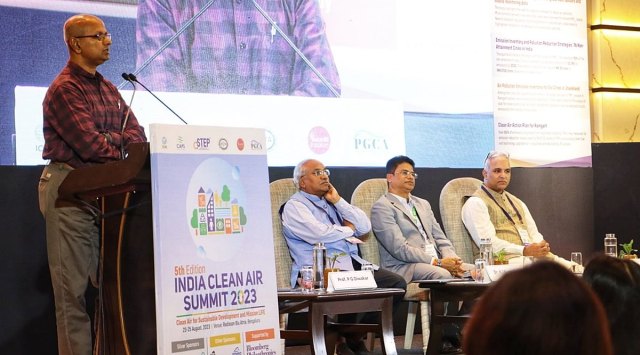Stay updated with the latest - Click here to follow us on Instagram
NIAS launches pilot project involving GEOAI and random forest tech to monitor air pollution in Bengaluru
Prof. PG Diwakar, ISRO chair professor at the National Institute of Advanced Studies (NIAS), Bengaluru said the same will be implemented in cities like Delhi, Mumbai, Chennai and Kolkata in the coming months.
 Prof. PG Diwakar, ISRO chair professor at the National Institute of Advanced Studies (NIAS), Bengaluru. (Express photo)
Prof. PG Diwakar, ISRO chair professor at the National Institute of Advanced Studies (NIAS), Bengaluru. (Express photo) Addressing a gathering at the India Clean Air Summit (ICAS) on Thursday, Prof. PG Diwakar, ISRO chair professor at the National Institute of Advanced Studies (NIAS), Bengaluru informed that NIAS has launched a pilot project involving geospatial artificial intelligence (GeoAI) and random forest technology to monitor and predict the city’s air quality.
He said the same will be implemented in cities like Delhi, Mumbai, Chennai and Kolkata in the coming months.
Random forest is a commonly-used machine learning algorithm which combines the output of multiple data to arrive at a result. Researchers use historical data collected from various air quality monitoring stations in a city and apply the random forest algorithm to predict the Air Quality Index.
GeoAI uses artificial intelligence, citizen science, satellite imagery, and mobile technology to identify the sources of air pollution.
Elaborating on the development, Diwakar said, “We’ve launched a pilot project right here in Bengaluru and are evaluating its effectiveness. Our goal is to extend this innovative technology to predict and monitor air quality in our bustling city. With confidence in our model, we are leveraging historical data to predict and validate current air quality. By integrating diverse data sources through conventional artificial neural network techniques, we are building a powerful predictive model. This project emphasises the importance of geospatial data, ensuring a comprehensive and impactful solution for Bengaluru’s air quality challenges.”
“If we can land on the moon, we can surely resolve air pollution around us,” he added.
“Our model will operate within a comprehensive geospatial framework. All data will seamlessly integrate into our meticulously curated geospatial database. As we progress, our focus extends beyond air pollution to encompass broader sustainable development goals (SDGs), addressing issues such as water pollution, electromagnetic radiation, and more. This holistic initiative reflects our commitment to pioneering transformative solutions that transcend conventional boundaries,” he further said.
Addressing the gathering, Selvi P K, Scientist, Central Pollution Control Board, said, “As guardians of environmental regulation, we are dedicated to the National Clean Air Program (NCAP) mission to curtail PM2.5 and PM10 by 30-40% by 2026. In Bengaluru, a city with the country’s second-highest vehicle population, a unique scenario has unfolded. Embracing the e-mobility surge, we are ensuring the safe disposal of lithium batteries. Beyond Bengaluru, Karnataka cities such as Hubli, Kabbangare, and Kalaburagi remain under our vigilant gaze.”
In this context, the Karnataka State Pollution Control Board (KSPCB) too has launched an initiative titled the Institute Industry Authority (IIA) Model. Under this initiative, the problems faced by several industries can be communicated through the pollution control board and a solution can be arrived at. Currently, it is a pilot project at an industry level.
Elaborating on this, Dr Shanth A Thimmaiah, Chairman, Karnataka State Pollution Control Board, informed the gathering: “The KSPCB introduced a concept of IIA under the research and development division. IIA can carry out research at the pilot scale as a resource, industry, and institute can be linked. This concept has to be percolated all across.”
In Karnataka, the measures aren’t limited to the pollution control boards and think tanks, even the Department of School Education and Literacy is involved in ensuring future generations are invested and involved in the air pollution subject.
“When we start talking about pollution, we start very early – Grade 5 onwards. We are doing a fair bit of sensitisation to the next generation as part of the curriculum. How do we introduce it in a practical curriculum through experiments? That has not happened yet in Karnataka. Can we develop some rudimentary tools? School students can do practical experiments in the chemistry laboratory to assess air pollution at a preliminary level. This is to ensure that they are invested and involved on the issue,” said Ritesh Kumar Singh, Principal Secretary to Government of Karnataka, Department of School Education and Literacy.
India Clean Air Summit (ICAS) is India’s premier event on air pollution, organised by the Centre for Air Pollution Studies (CAPS) at the Center for Study of Science, Technology and Policy (CSTEP).







